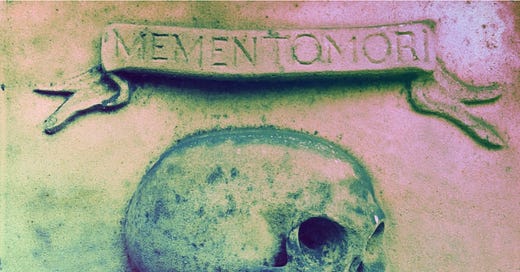Death is the mother of beauty.
Wallace Stevens
The epigraph here from the poet Wallace Stevens can be a little baffling to the uninitiated, so a quick explanation is in order. If you are familiar with this quote and its meaning, just jump ahead.
The assertion appears twice in Wallace Stevens’ well-known poem “Sunday Morning” (1923). Perhaps you read the poem in a lit class. Most simply, Stevens is suggesting that in suffering loss, we discover what we have. In other words, if all the world were crammed with blooming flowers year round with no wilting or rot, we would cease to value their loveliness. Therefore, because death and rot are inevitable, we appreciate the aesthetics of what we have. It is a commonplace, but Stevens articulates it most succinctly.
Steven’s observation is in line with the Stoic concept of momento mori, a practice in which the contemplation of mortality leads to greater appreciation of that and those which we value. The Stoics, by the way, are not the joyless weirdos that our culture imagines. Stoicism, as practiced in ancient Greece and Rome, mostly emphasized the preeminence of virtue and positive emotions — such as happiness — over destructive emotions — such as anger or fear. The Stoics were not cold and indifferent as they are often conceived. They just preferred to experience the good emotions while avoiding the bad ones.
Philosopher William B. Irvine in his excellent The Stoic Challenge explains the concept of memento mori well.
I, too, will someday utter my last words; indeed, there is a long-shot chance that I have already uttered them. More generally, for everything I do, there will be a last time I do it. You might think these are dark and depressing thoughts, but they can have just the opposite effect. They can help us transform our ability to speak from something we take completely for granted into what it in fact is — something remarkable and precious.
So in that spirit, perhaps these here are the very last words I shall ever write.
Or maybe these.
…
Think of the last meal you consumed. What if you learned it was, indeed, your last meal ever? Would you be disappointed by the realization that a bowl of Cocoa-Puffs in milk may be the final food you ever gobble, or does the thought make you appreciate all that refined sugar all the more?
What else might you enjoy but take for granted? Walking, watching sunrises, sex? Some reading this essay may in fact not be able to do one or more of these things, a reality that warrants a little contemplation.
Yes, depending on your religious or cosmic beliefs, death will likely have an observable deleterious effect on your ability to indulge in physical pleasures. Alternately, in some afterlife, all physical pleasure will be persistently in such abundance that we remain perfectly, perpetually, and unspeakably satisfied. Stevens, in “Sunday Morning,” plays with this idea of “imperishable bliss”:
Is there no change of death in paradise?
Does ripe fruit never fall? Or do the boughs
Hang always heavy in that perfect sky,
Unchanging, yet so like our perishing earth.
In this vision of paradise — lush, magnificent, and permanent — heaven turns out to be a dreadfully dull place. If everything is forever and ideally wonderful, nothing can then fill us with wonder. Hence, “Death is the mother of beauty.”
Maybe contemplating death is a bit too heavy, so let’s take your inevitable demise out of the equation. When was the last time you traveled abroad for fun, the last time you turned on the lights to dissipate the darkness, the last time you freely petitioned or protested the government? What if each of these experiences was your last time ever despite a long life ahead of you? After all, the end of each is quite conceivable.
In the midst of a pandemic, we can see the unintended perils of international travel, which may lead us to reject it utterly or governments to discourage and restrict it.
In an age of massive weather disruptions as well as rampant cyber attacks, our electrical infrastructure can seem one incident away from total collapse. If you have ever been afflicted by a lengthy blackout, you know how debilitating that would be as your freezer defrosts once and for all.
In an moment when our very democracy seems in peril, we have witnessed chaotic responses to legal protests, sometimes from government actors sometimes from counter-protestors. How much more mayhem can we endure before we sacrifice our fundamental right and ability to peaceably assemble in order “to petition the government for a redress of grievances?”
If you knew your last time doing any of those things was the very last ever, would that change your perspective at all? I last traveled abroad in 2019 on a trip to Israel. As much as I enjoyed that visit, would I have tried to extract even more enjoyment from it if I knew I could never travel again? Would I have stayed longer, done more, visited more sites, eaten more shakshuka? I have no guarantee I will ever travel to other countries again, so the question is not academic. As it happens, simply imagining that was my last sojourn abroad renews my appreciation. Even writing this paragraph summons a sudden desire to look through the many photos I took there and recall the joy I felt at the sights and the sounds.
Momento mori is a powerful force.
The Stoics remind us that there is a last for everything in this life — a last time we will see a loved one, a last breath we draw. Contemplating the temporary nature of our earthly existence need not be morbid or self-indulgent, but just recalling and briefly contemplating our impermanence can be enough to spark renewed appreciation for life and all it offers. Indeed, “Death is the mother of beauty.”
Signing off til next time. If there is one.
By the way, if you are interested in reading more about Wallace Stevens, I recently published a piece on him and his literary conversation with my good friend Bob Dylan (note: we have never met) about, of all things, death. You can read it online in the summer 2021 issue of the Dylan Review.
Share your thoughts on this topic or participate in a discussion by leaving a comment below or by contacting me directly by email:
You must register with Substack to leave a comment, which stinks but is painless and free.
I look forward to hearing from you.
Get a free consultation to learn how I can help enhance your leadership and communication skills.
Post this essay on social media or send it by email to someone you want to inspire or annoy.
Subscribe to receive my weekly newsletter and special editions directly to your mailbox.
Learn how you can improve your ability to achieve your organization’s mission.
















Share this post